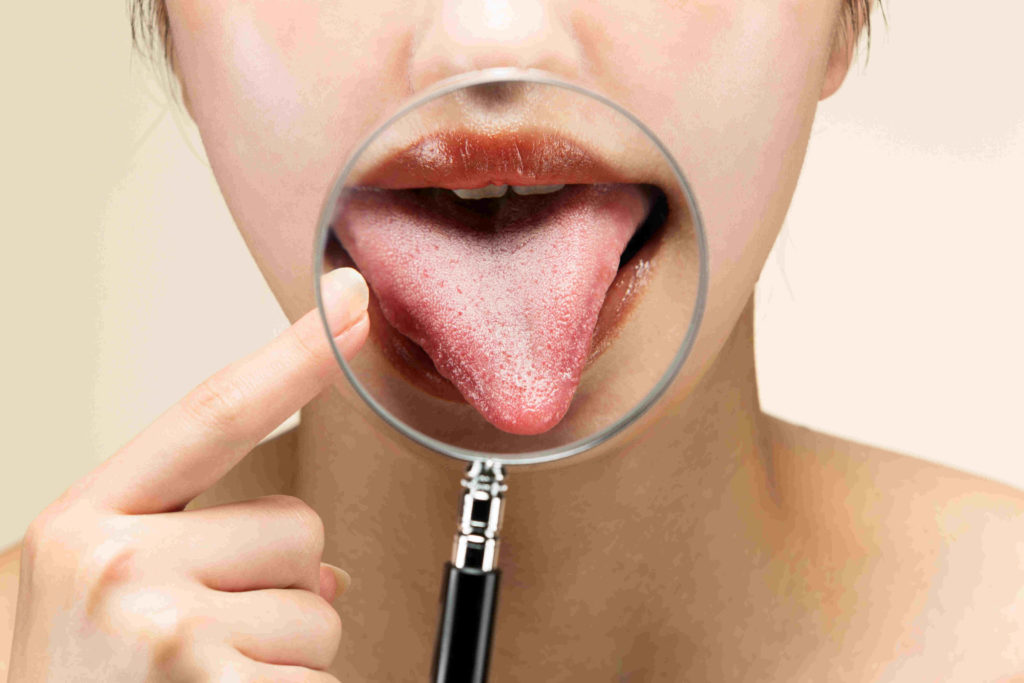Tongue ulcers can have a number of causes. These benign mouth ailments can also appear on the inside of the cheeks, lips and gums. Mouth ulcers are very common, but that doesn't take away from the discomfort and pain they can cause. The Helvident team explains what you can do to treat tongue ulcers.
What is a canker sore?
A canker sore is a lesion of the oral mucosa on the inside of the mouth, tongue or gums. Young people and women are more affected than the rest of the population. Most of the time, these ulcerations are unique, evolve in flare-ups and heal spontaneously.
Duration
In their minor form, tongue ulcers generally disappear after 5 to 10 days. Miliary or herpetiform canker sores, on the other hand, take an average of 15 days. These can be identified by the ulcerated area formed by a multitude of tiny vesicles. In their largest form, canker sores exceed 10 mm in diameter. Healing takes 5 to 6 weeks. These ulcerations are not contagious.
Causes of tongue ulcers
The precise cause of mouth ulcers remains unknown. However, certain factors seem to play a role in their appearance:
- brushing teeth too vigorously
- mucous membrane bite
- friction with a poorly positioned denture
- fatigue
- stress
- menstrual period in some women
- consumption of certain foods: nuts, peanuts, spices, Gruyère cheese, shellfish, strawberries, tomatoes, etc.
- certain medications: non-steroidal anti-inflammatory drugs, beta-blockers, biphosphonates, cancer treatments, etc.
Deficiencies in vitamins and minerals (iron, vitamin B) are also sometimes mentioned, but there's no certainty. On the other hand, it is known that certain more serious diseases can have, among other symptoms, the frequent appearance of mouth ulcers. Examples include Crohn's disease and other digestive disorders.
What can you do to prevent it?
The best way to prevent tongue ulcers is to practice good oral hygiene. Brush your teeth at least twice a day. We recommend using a toothpaste that contains no sodium lauryl sulfate. This foaming agent, present in most toothpastes, can cause mouth ulcers in predisposed individuals.
If you have a tendency to develop mouth ulcers, moderate your consumption of the above-mentioned foods. Bad habits such as biting or brushing your teeth too hard can also lead to mouth ulcers. Finally, have your dentures checked for correct positioning. Dentures can also cause mouth ulcers locally.
Treatments for mouth ulcers
For benign canker sores, your doctor or pharmacist will suggest a local treatment. This involves the use of mouthwash, anesthetic gel or lozenges, or mouth spray.
Do you suffer from chronic canker sores (several episodes a year) or generalized aphthosis in several areas of the body? In this case, a specialist will prescribe basic treatments to reduce or eliminate outbreaks.
If mouth ulcers are a symptom of an underlying disease, it will of course be necessary to treat it. Mouth ulcers will disappear if the underlying condition is treated.
Natural remedies for tongue ulcers
There are a number of effective remedies for relieving the pain of a tongue ulcer. Lemon is one of them, thanks to its antiseptic and anti-inflammatory properties. With your doctor's approval, you can apply one or two drops of squeezed lemon juice directly to the affected area, twice a day. For the more sensitive, use a mouthwash made with a glass of lukewarm water, the juice of half a squeezed lemon and a spoonful of thyme honey.
Another essential ingredient for soothing mouth ulcers is salt. In practice, dilute coarse salt in lukewarm water and wash your mouth several times a day. This cleanses the oral cavity. The pain may seem worse at first, but it's temporary and the benefits will soon be felt.
In phytotherapy, sage has useful medicinal properties for mouth ulcers. In fact, it is an excellent antiseptic and anti-inflammatory. This plant helps to heal mouth ulcers by accelerating the healing process. Prepare an infusion of sage leaves and flowers and use as a mouthwash.
Please note: if you are taking medication, be sure to tell your doctor or pharmacist before taking any phytotherapeutic treatment. This advice does not replace that of a doctor or pharmacist. If symptoms persist or worsen, consult your doctor as soon as possible.

